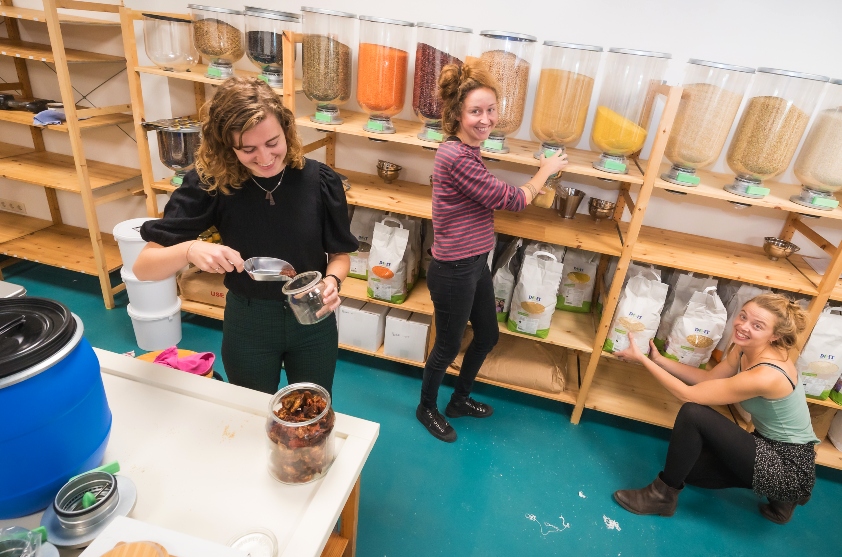During the Academic Consultancy Training (ACT) WUR-students conduct commissioned research and offer advice. This was also done for ‘De Gieterij’, a new, sustainable shop to open in Wageningen on Saturday 10 October.
‘Our clients wanted to open another sustainable store in Wageningen centre for organic and local products,’ says Juul Kappelhof (24), a masters student of Communication and Innovation. ‘they asked us to investigate whether there would be interest in such a store in Wageningen.’ With “us”, Kappelhof signifies her group of six masters students who worked on the project under the supervision of an academic consultant and a coach.
Young and old
Kappelhof and her fellow students studied Wageningen consumers and their wishes. ‘We investigated what consumer groups would be most interested and who might become a regular customer. This revealed three distinct groups: a portion of the student population, young females aged 25 to 40, often with a young family, and educated people over 55 years of age, with time and money to spare. A keen interest in sustainability and affluence play a role for each of these groups. We then went on to interview representatives of these groups to find out what their desires are.’
The shop wants to sell package-free, but some of the consumers fear that vegetables and fruit could perish
Juul Kappelhof (24), masters student Communication and Innovation
his led to a number of conclusions, says Kappelhof. ‘There were challenges. The shop wants to sell package-free, but some of the consumers fear that vegetables and fruit could perish. This can be solved by using a cooling system or sustainable packaging materials.’ Consumers also appeared to want more information on the impact of products and their origin. ‘This is something they want to address through, for example, information evenings with local farmers.’
Supply in bulk
While the students conducted their research, the clients were scouting locations and talking to suppliers. Linde van der Knaap is a WUR alumnus (MSc Organic Agriculture) and one of the clients. ‘Floor Hofman (MSc Biology, Ed.) – my partner in De Gieterij – and I were still scouting during the ACT commission. We both have experience in another organic shop, so we already had expertise on the side of supply. But we needed the students to research what the Wageningen consumer wants and is looking for.’
We needed the students to research what the Wageningen consumer wants and is looking for
Linde van der Knaap, founder of De Gieterij
One of the lessons learned by De Gieterij from the ACT-project is that many students are interested in buying sustainably. Van der Knaap: ‘There are many large student households. What can we offer them? Bulk supplies. We sell five-kilo bags of lentils and rice, which is extra economical and more sustainable in terms of packaging waste. The students advised us to provide a freight bicycle that customers can borrow to take their shopping home. This way, we are also accessible to less affluent consumers.’ Products that are tapped are also cheaper, says Van der Knaap. ‘And even more sustainable, as consumers bring their own containers.’
Where does it come from
‘Another lesson is that there is no such thing as a single type of sustainable consumer’, says Van der Knaap. ‘One person may feel that no packaging is most important, while the next may visit to buy local produce. They want to know: where does it come from, how many kilometres has the product travelled to end up in our store? This is something we will take into consideration in our set-up.’
De Gieterij is to open on Saturday 10 October, sustainability day. Van der Knaap: ‘We would love to have a grand and festive opening with music, but corona makes that impossible. So we have opted for a festive day, with, for example, a tasting table where you can sample our products.’

 Student Juul Kappelhof (left) working with founders of De Gieterij Linde van der Knaap (middle) and Floor Hofman to set up the shop. Photo: Sven Menschel
Student Juul Kappelhof (left) working with founders of De Gieterij Linde van der Knaap (middle) and Floor Hofman to set up the shop. Photo: Sven Menschel